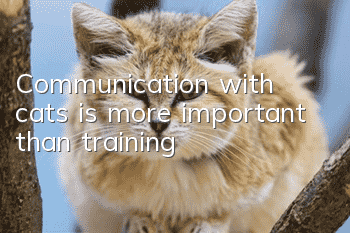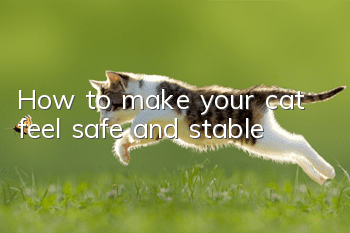Communication with cats is more important than training

Training and conditioning are essential for cats, but sometimes the results are not satisfactory. This may be due to a communication problem with the cat. If you want to train a cat, you must first understand the cat and know what it is thinking. Only in this way can the training be successful. However, because cats are not as outgoing as dogs and rarely take the initiative to please or express enthusiasm, cat owners often encounter obstacles when communicating with them. They do not know whether they are doing the right thing or whether they are It’s not that we understand what we mean, let alone whether they really care about us, so communicating with cats is not easy. We need to be patient, persuasive, and of course pay attention to methods.
1. Build trust and eliminate domestic violence
As an owner, what you need to master and be proficient in is to maintain effective communication with your cat, provide it with the help it needs, make it feel your love, and be able to give it kindness when it does something wrong. Reminders and corrections. All communication must be friendly, including reprimands, and keeping the right tone is key. For example, you just need to let it know that you don't like something it does, and you should stop and reprimand it in time when the thing is going on. Stop it as soon as you point it out, and never resort to violence. One of the differences between cats and dogs is that the saying "filial sons come out of the stick" may apply to some dogs, but for cats, once they are punished corporally, they will lose trust in humans out of fear. And lead to personality changes, and it may also engage in more drastic behavior out of self-protection.
When we do something wrong without knowing it, we always hope to be understood and treated kindly, not to mention sensitive cats? Becoming someone they can trust and trust is the first thing we need to do. Step by step, only when trust is established can communication and training become possible.
Cat’s body language is also an aspect we need to understand. A cat’s body language is shown through its posture. Often you can use your intuition to determine what your cat is feeling and needs. A contented cat is most easily recognized because it relaxes itself completely and closes its eyes. When a cat is relaxed, it stretches its limbs and waves its paws. At this time, you can go up and scratch it gently, and it will lie on its back on the ground and let you continue to scratch it. Cats will also sometimes stomp and purr when satisfied. This is because he used to have to stamp out the milk when he nursed.
2. Combining rewards and punishments, standardize your language first
Then, should cats be friendly or even give snacks to show understanding even if they do something wrong? Big mistake. Friendly treatment includes avoiding violence, including not corporal punishment, but it does not mean that cats should be praised or even rewarded even if they do something wrong. Don’t overdo it, pampering is not good for your cat either, unless you want your cat to be your big boss and be able to obey your every word. Otherwise, inWhen your cat does something wrong, please reprimand and correct it promptly.
It is best to choose reprimanding words with pronunciations that are easy to recognize and remember, such as "No" and "No". It is best for family members to use the same words for reprimanding cats. Don't get used to using "No", as my sister likes to say "No", the mother will say, "Look what you did!" and the father will say "stop"... This will make the cat very confused, "What is the situation? What does this family want to say?" Select one or two. By using words and raising the volume appropriately, the cat will soon understand what you mean and stop the wrong behavior.
When a cat makes a mistake, you need to be patiently educated. It does not mean that criticism today will be allowed tomorrow, but criticism should be done patiently with the same attitude at all times. If a person gives up halfway, all the hard work he has done before will be in vain. "You'll forgive me soon anyway." In this way, the cat will get carried away. Then there is absolutely no corporal punishment. If a cat is hit casually, it will have a sense of fear in the owner, which will lead to a character of inferiority. Because the cat's body is much smaller than that of a human, it is likely to be injured if it is hit. Finally, when it performs well, it should be greatly praised on the spot. Although the cat cannot understand the owner's words, it knows very well that the sound of scolding and the sound of praise are different. When a cat is praised, its mood will also improve, so the effect of education will gradually increase.
3. If a cat is emotional, first find the reason from yourself
It took a while after you got home to realize that you didn’t see the cat? After searching around, you found that it had hidden in the closet or under the bed, refusing to come out, and even "meowing" in displeasure when it saw you? What was your first reaction at this time? First, do a surprise inspection at home to see if she did something wrong? Did she break a vase or scratch the sofa?
If it’s a dog that hides and whines with its head down when you come home, you really need to check if it has made a mistake, but this situation may not apply to cats. If your cat hides or expresses dissatisfaction when seeing you, it is likely that the problem lies directly with you. Don't rush to defend yourself. This "problem" may not be worth mentioning in the eyes of humans, but it is quite serious for sensitive cats. For example, if you invite a group of friends to your home, the noise and the smell of strangers may cause discomfort to the cat, causing it to resist and hide itself. Or maybe you just went to get a haircut, and the cat ran away in fear when it saw you. The reason may not be because of you.The cat has a new hair style, but the smell of the medicine used when doing the hair makes the cat feel uncomfortable, so it has to run away to avoid smelling the smell. Although dogs do all the work of anti-drug search and rescue, cats’ noses are no less sensitive. They can quickly identify any unfamiliar, pungent, or unpleasant smells and take timely action: hide or run away. , or even protest.
When you find that a cat behaves abnormally, and after eliminating physical factors, you need to find out the cause of the abnormal behavior. Simply reprimanding and correcting it is meaningless, because "the person who untied the bell must also tie the bell."
If it is indeed a disobedient cat, then the owner can no longer pamper it unprincipled, as this will only make the cat more unscrupulous. Owners should train cats from an early age to develop good living habits and attitudes towards people. And guide and train the cat to complete the training content, and give it care and attention. Let the cat regard him as his master and obey him.
- A 7-month-old cat eats very little and has gastrointestinal problems!
- Why cats don’t bury poop
- Why can’t cats eat chocolate?
- What are the characteristics of a cat in heat? How to tell if a cat is in heat?
- Is mosquito repellent harmful to cats?
- What should I do if my cat eats plastic wrapping paper?
- What are the precautions for raising civet cats?
- What could be the cause of difficulty breathing in newborn kittens?
- Can cats with food allergies recover on their own? Is it contagious?
- When do British Shorthair silver gradations develop on the cheeks?



